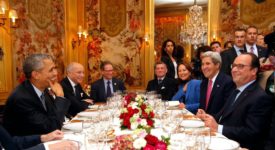Since the initiation of the ‘Global Europe’ strategy, which set out a new agenda reflecting European strategic priorities in trade, the European Union has launched Free Trade Agreement (FTA) negotiations with various Asian countries in an attempt to address barriers to EU exports. The removal of both tariff and non-tariff barriers in these so-called ‘new generation’ agreements helps to open up new markets for European exporters and increase European competitiveness.
The finalization of the EU-Korea FTA demonstrated a good example of such FTA, in which the EU prioritizes a partner with a large and growing market with high initial protection. There are currently many other FTAs under negotiation with countries that fulfil one of these criteria (e.g. Singapore, Malaysia, India, and Vietnam). In this context, one can only question as to why Taiwan is not on the list of potential EU’s FTA partners and whether it is because of certain geopolitical obstacles or because this Asian economic powerhouse is deemed as not fitting the set criteria.
The available statistical data are telling: Taiwan is the 5th largest economy in Asia after Japan, China, India and South Korea; it is the world’s 18th largest trading economy, 6th most competitive economy globally in overall competitiveness and has the 3rd best investment environment in the world. However, as a result of tense cross-strait relations and growing economic importance of China in the region, Taiwanese economy finds itself being somewhat isolated, while essentially all of the other Asian countries are currently undertaking steps towards greater economic integration. Given that Taiwan is not formally recognized as a sovereign state by its main trading partners, the situation is very complicated and the overall circumstances do not favour deeper economic ties with the neighbouring states.
Despite its complicated position in the international system, Taiwan attempts to further integrate its economy with China and the rest of the world in order to establish grounds for deeper cooperation with other countries in the region. In 2010, Taiwan and mainland China negotiated an Economic Cooperation Framework Agreement (ECFA), aiming to build an important economic link that would not only normalize the cross-straits economic relations, but would also set a founding stone for future FTAs with other key partners in Asia, in the West, particularly with the EU.
However, a potential FTA with Taiwan is a very sensitive issue as there is a widespread belief within the policymakers in Brussels that such a move would upset the EU’s political and economic relations with China. The great paradox is that, based on the European criteria for its FTA partners, Taiwan should be somewhere at the top on the EU agenda. Even though the Taiwanese economy is smaller compared to Korea or India, Taiwan fulfils the criteria of market size if the strategic triangular relationship EU-China-Taiwan and the effects of access to the vast Chinese market are taken into account. Taiwan has currently very low initial tariff barriers, but the non-tariff barriers provide a powerful reason for the continuation of discussions on possible trade enhancement.
Even though the current trade exchange is lower compared to other partners like South Korea or Hong Kong, there is an untapped potential in the EU-Taiwanese relations that could be established through trade liberalization. The EU should support this initiative because the FTA would bring many positive effects for European exports. European firms could strengthen their position in the Taiwanese market and generally raise their profile in Asia. Moreover, this European step would contribute to the creation of a special triangular relationship between the EU, China and Taiwan, assuming that trade liberalization between the EU and Taiwan will interact positively with trade liberalization between Taiwan and China.
Alice Rezkova is an independent economic consultant specializing in the Southeast and East Asian regions.






